【2015中考复习方案】2015届九年级英语复习课件(山西):第3课时 Units+1—4 [七年级下册](共39张PPT)
文档属性
| 名称 | 【2015中考复习方案】2015届九年级英语复习课件(山西):第3课时 Units+1—4 [七年级下册](共39张PPT) | 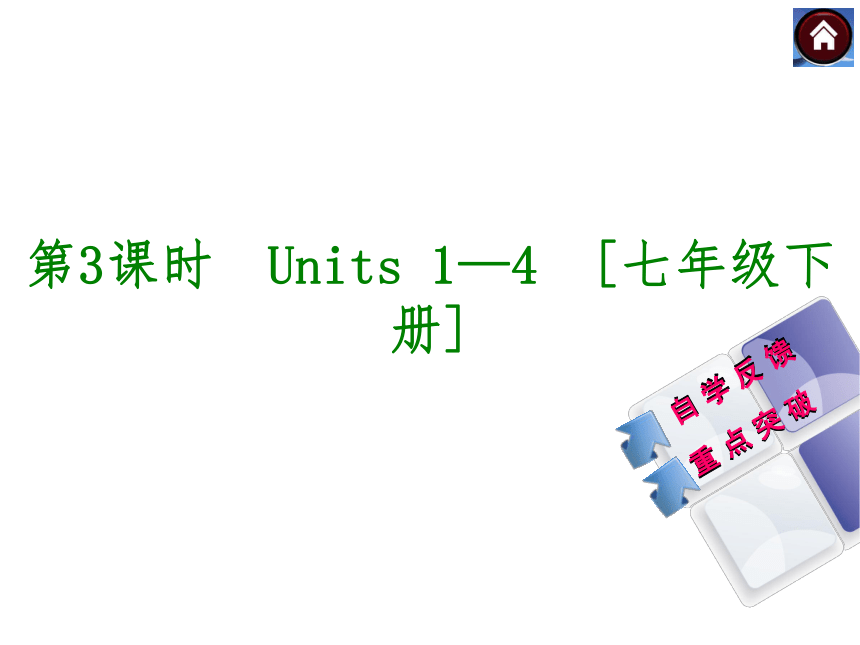 | |
| 格式 | zip | ||
| 文件大小 | 278.3KB | ||
| 资源类型 | 教案 | ||
| 版本资源 | 通用版 | ||
| 科目 | 英语 | ||
| 更新时间 | 2014-12-12 21:51:22 | ||
图片预览

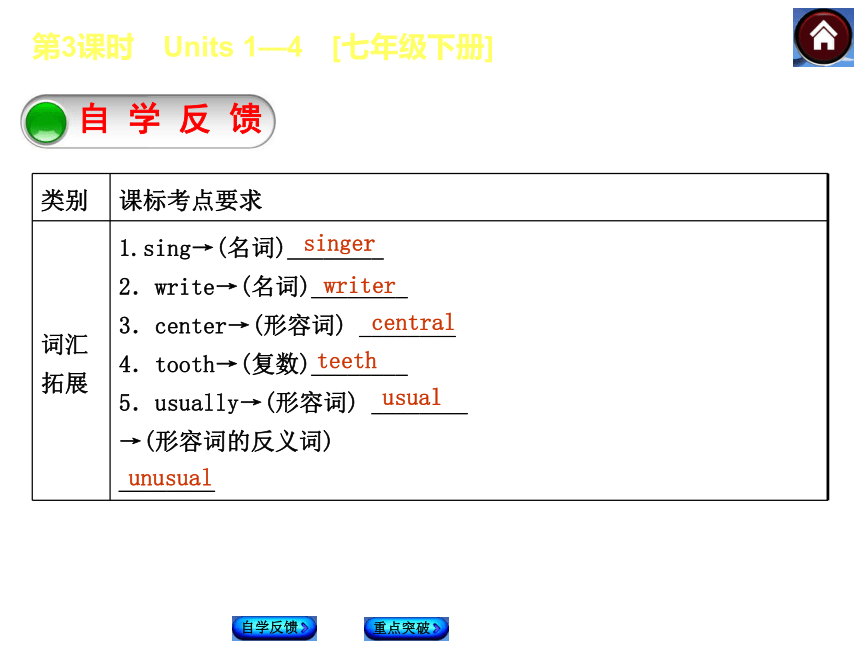
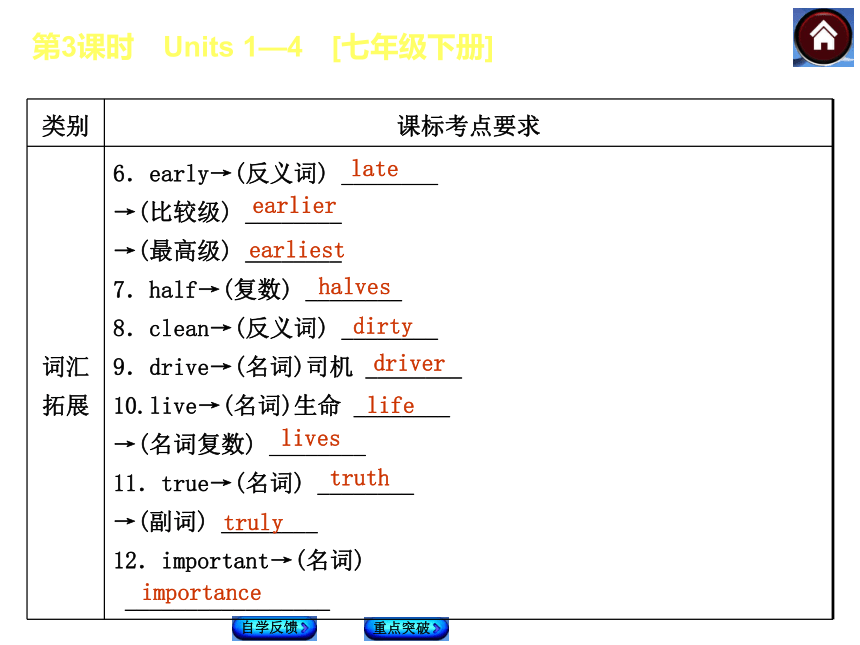
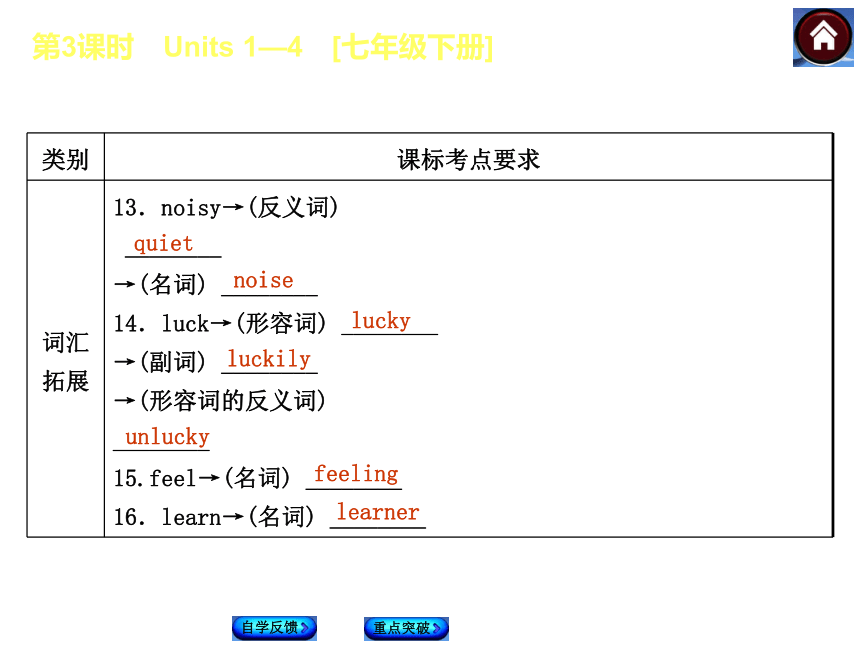
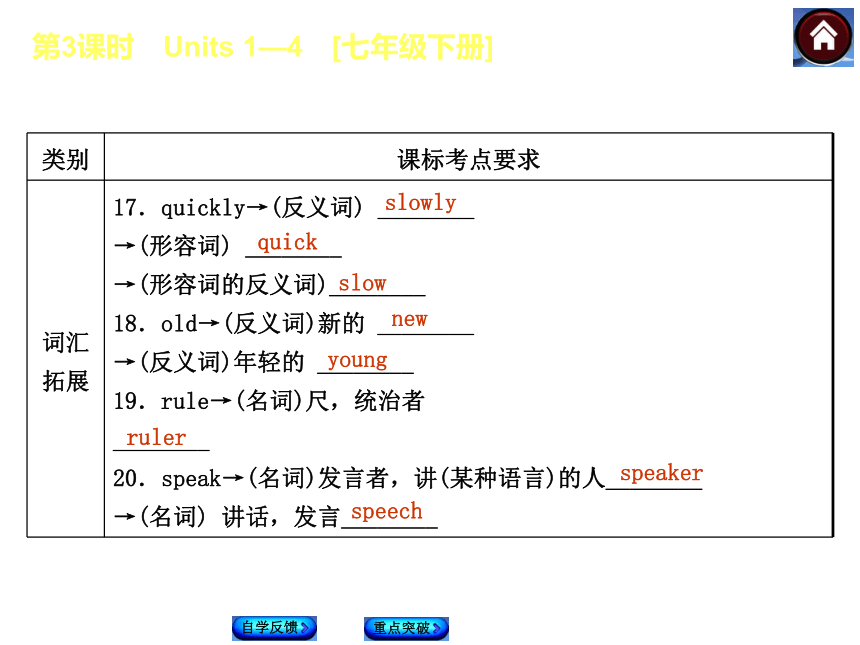
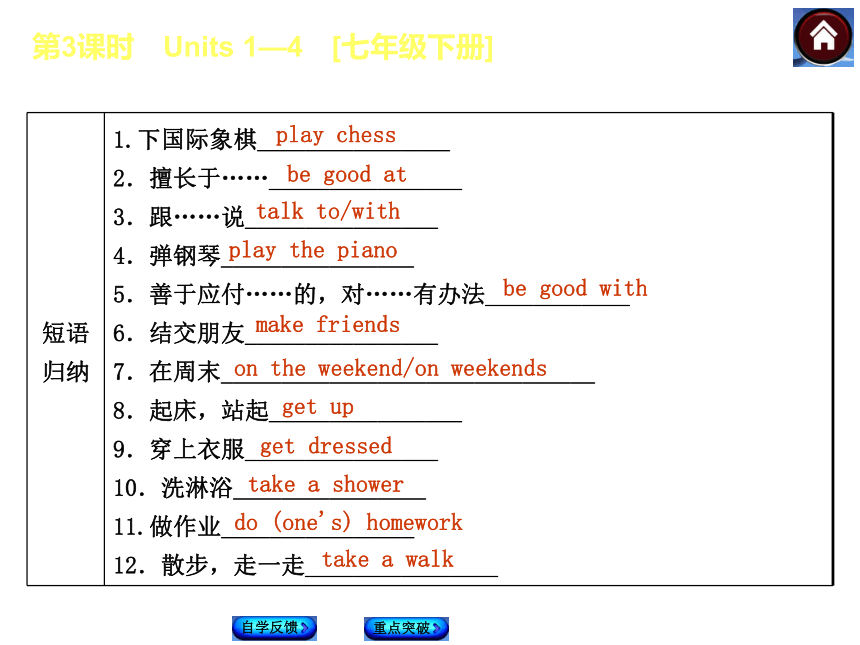
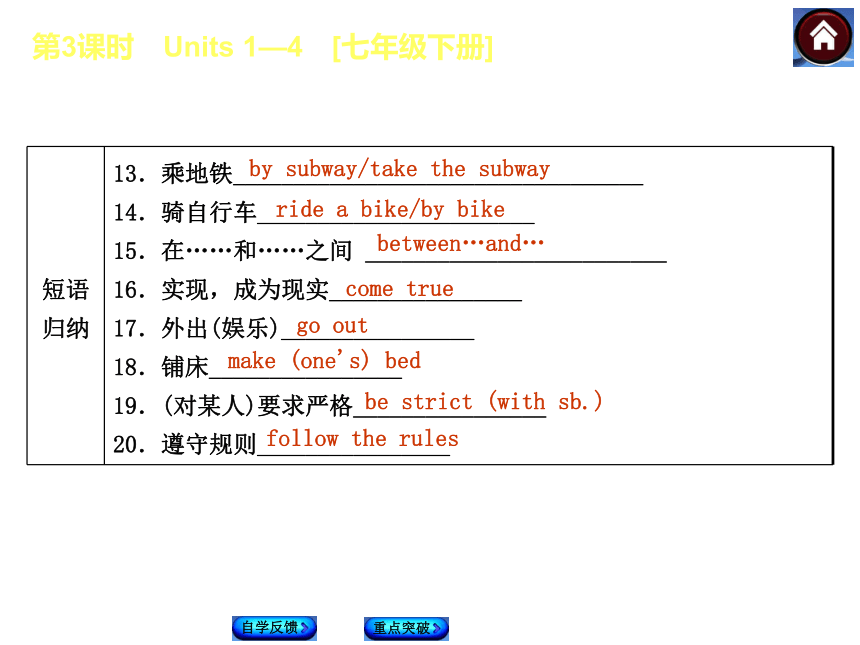
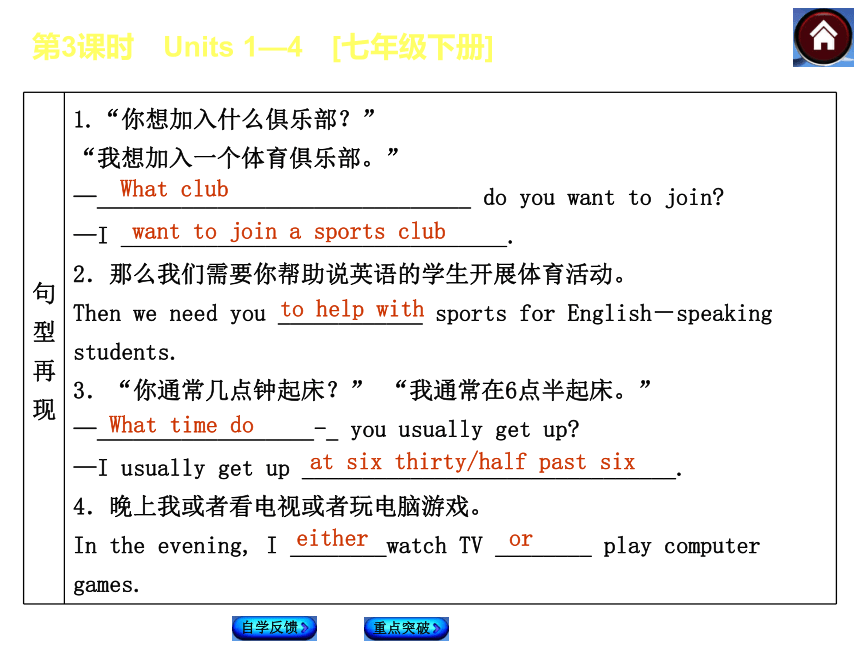
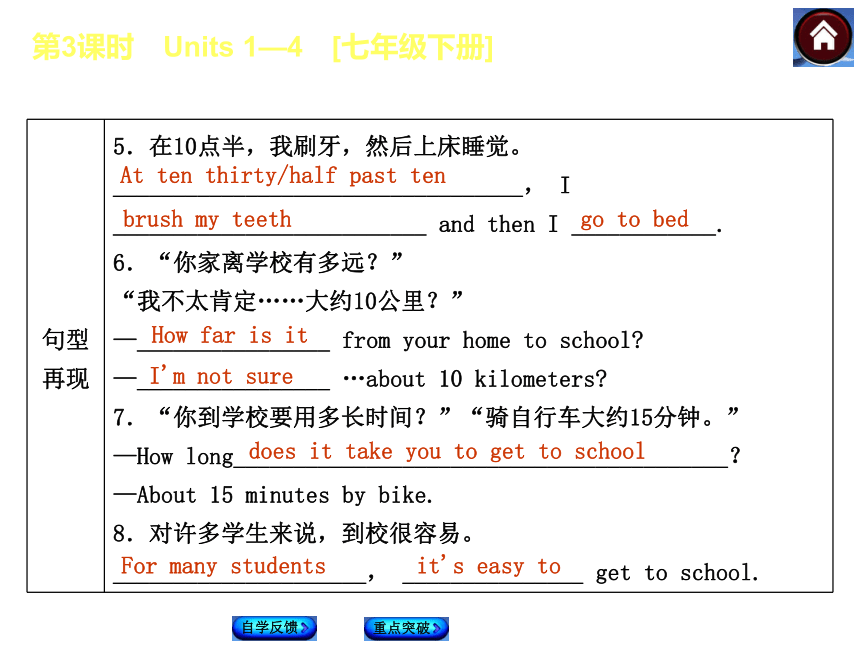
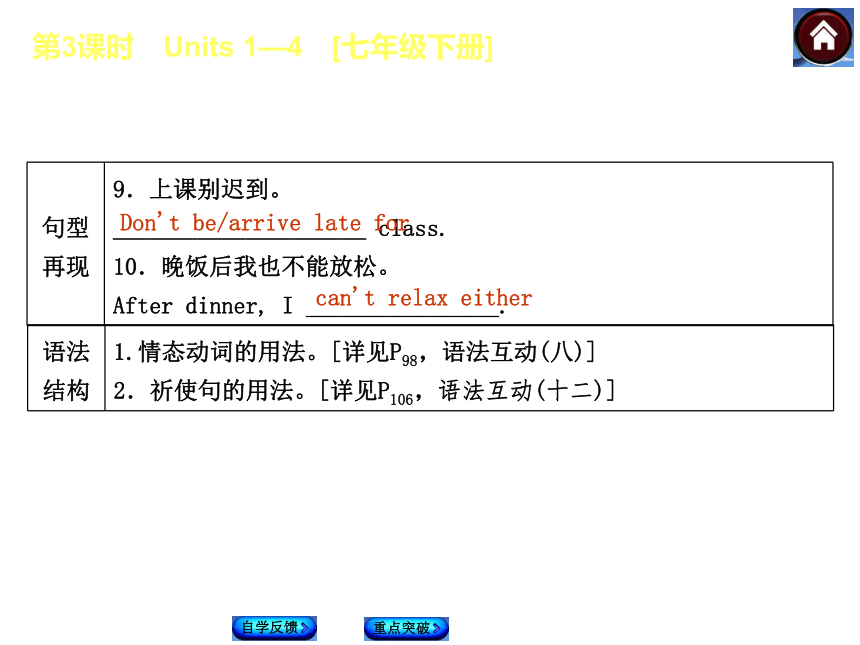
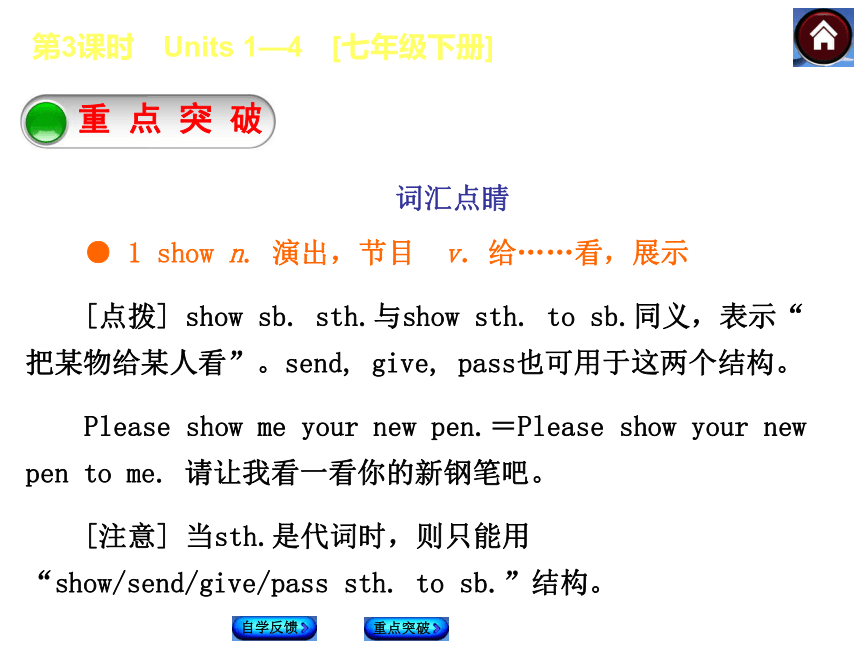
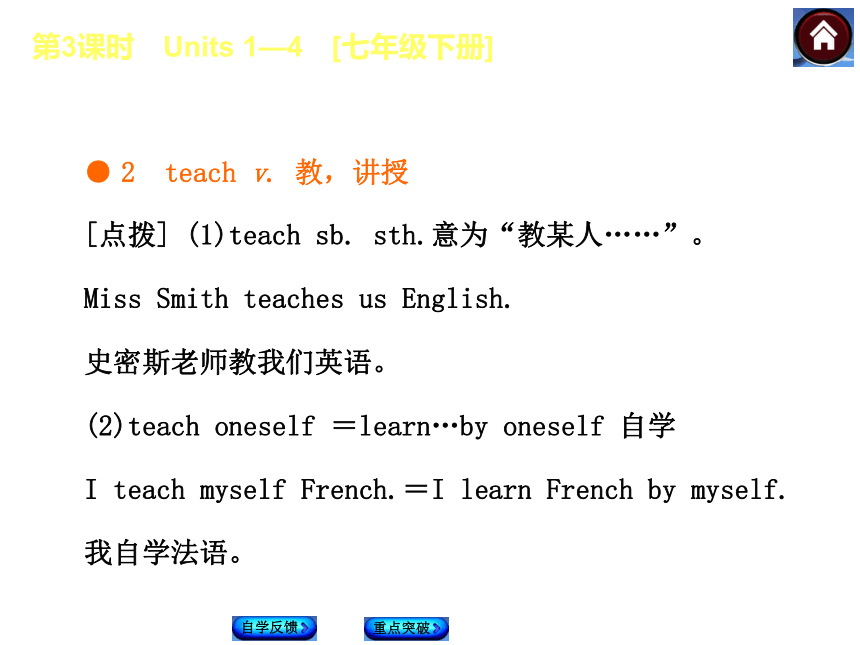
文档简介
课件39张PPT。第3课时 Units 1—4 [七年级下册] 第3课时 Units 1—4 [七年级下册] 自 学 反 馈 自学反馈重点突破 singer writer central teeth usual unusual 第3课时 Units 1—4 [七年级下册] 自学反馈重点突破 late earlier earliest halves dirty driver life lives truth truly importance 第3课时 Units 1—4 [七年级下册] 自学反馈重点突破 quiet noise lucky luckily unlucky feeling learner 第3课时 Units 1—4 [七年级下册] 自学反馈重点突破 slowly quick slow new young ruler speaker speech 第3课时 Units 1—4 [七年级下册] 自学反馈重点突破 play chess be good at talk to/with play the piano be good with make friends on the weekend/on weekends get up get dressed take a shower do (one's) homework take a walk 第3课时 Units 1—4 [七年级下册] 自学反馈重点突破 by subway/take the subway ride a bike/by bike between…and… come true go out make (one's) bed be strict (with sb.) follow the rules 第3课时 Units 1—4 [七年级下册] 自学反馈重点突破 What club want to join a sports club to help with What time do at six thirty/half past six either or 第3课时 Units 1—4 [七年级下册] 自学反馈重点突破 At ten thirty/half past ten brush my teeth go to bed How far is it I'm not sure does it take you to get to school For many students it's easy to 第3课时 Units 1—4 [七年级下册] 自学反馈重点突破 Don't be/arrive late for can't relax either 第3课时 Units 1—4 [七年级下册] 重 点 突 破 词汇点睛自学反馈重点突破 ● 1 show n. 演出,节目 v.给……看,展示
[点拨] show sb. sth.与show sth. to sb.同义,表示“把某物给某人看”。send, give, pass也可用于这两个结构。
Please show me your new pen.=Please show your new pen to me. 请让我看一看你的新钢笔吧。
[注意] 当sth.是代词时,则只能用“show/send/give/pass sth. to sb.”结构。第3课时 Units 1—4 [七年级下册] ● 2 teach v. 教,讲授
[点拨] (1)teach sb. sth.意为“教某人……”。
Miss Smith teaches us English.
史密斯老师教我们英语。
(2)teach oneself =learn…by oneself 自学
I teach myself French.=I learn French by myself.
我自学法语。自学反馈重点突破 第3课时 Units 1—4 [七年级下册] ● 3 strict adj. 严格的,严厉的
[搭配] be strict with sb. 意为“对某人要求严厉”; be strict in sth. 意为“对某事要求严格”。
She is strict with her children and in her work.
她对子女严格要求,对工作很严格。自学反馈重点突破 第3课时 Units 1—4 [七年级下册] ● 4 remember v.记住,记起
[搭配] remember/forget to do sth. 记得/忘记去做某事(表示事情未做);
remember/forget doing sth.记得/忘记做过某事(表示事情已做) 自学反馈重点突破 第3课时 Units 1—4 [七年级下册] 巧辨异同自学反馈重点突破 ● 1 be good for/be good at/be good to/be good with
(1)be good for 表示“对……有好(益)处”,反义词组为be bad for。
Eating too much is not good for your health.
吃太多对你的健康没有好处。第3课时 Units 1—4 [七年级下册] (2)be good at与do well in同义,表示“在……方面(学得,做得)好,擅长……”,后接名词或动名词形式。
Some of us are good at swimming.
我们中有些人擅长游泳。
(3)be good to表示“对……仁慈(和善)”,与be kind/friendly to同义。
The old man is very good to the students.
那位老人对学生们很和善。自学反馈重点突破 第3课时 Units 1—4 [七年级下册] (4)be good with与get on well with同义, 表示“与……相处融洽”。
Mr. Smith is good with his neighbors.
史密斯先生和他的邻居们相处得很融洽。自学反馈重点突破 第3课时 Units 1—4 [七年级下册] ● 2 across/through/over/past/cross
(1)across为介词,表示“从……表面穿过”或者“横穿”,across from意为“在……对面”。
He can swim across the river.他能游过这条河。
(2)through为介词,表示“从……内部穿过”,往往指穿过沙漠、森林,(光线)透过窗户等。
The river runs through the city.
这条河流经这座城市。自学反馈重点突破 第3课时 Units 1—4 [七年级下册] (3)over为介词,意为“翻越”,表示到达高的障碍物(如树、墙、篱笆和山脉等)的另一侧。
He jumped over the wall. 他跳过了墙。
(4)past为介词,意为“走过,经过”,指从某物或某人旁边经过。常用短语为“walk/go past=pass”。
He walked past me without saying “Hello”.
他没打招呼就从我身边走过去了。自学反馈重点突破 第3课时 Units 1—4 [七年级下册] (5)cross为动词,表示“穿过”,相当于go across。
The old man is crossing(=is going across)the road. 这位老人正在过马路。自学反馈重点突破 第3课时 Units 1—4 [七年级下册] ● 3 between/among
(1)between一般指在两者之间,常与and连用。
(2)among一般用于三者或三者以上的人或物之间。自学反馈重点突破 第3课时 Units 1—4 [七年级下册] ● 4 wear/put on/dress/in自学反馈重点突破 第3课时 Units 1—4 [七年级下册] ● 5 bring/take/get/carry自学反馈重点突破 第3课时 Units 1—4 [七年级下册] [注意]
(1)三者在一定情况下可相互转换。
(2)当它们后接地点副词there, here和home时,副词前不加任何介词。
When did you arrive/get/reach home?
你何时到家的?自学反馈重点突破 第3课时 Units 1—4 [七年级下册] 句型透视自学反馈重点突破 ● 1 Then we need you to help with sports for English-speaking students. 那么我们需要你帮助说英语的学生开展体育活动。
[点拨] help with sth.帮助做某事;
help sb. (to) do sth.=help sb. with sth.
帮助某人做某事
[拓展] help oneself to sth.随便吃(喝)……;
with the help of sb.=with sb.'s help;第3课时 Units 1—4 [七年级下册] 在某人的帮助下;
ask sb. for help 向某人求助自学反馈重点突破 第3课时 Units 1—4 [七年级下册] ● 2 —How does Mary get to school?
玛丽是如何到校?
—She takes the subway. 她坐地铁。
[点拨] 表示“乘坐某种交通工具”可用以下表达:
(1) take/ride/drive+冠词/形容词性物主代词+交通工具名词
(2) by+单数交通工具名词自学反馈重点突破 第3课时 Units 1—4 [七年级下册] (3)in/on+冠词/形容词性物主代词+交通工具名词
Dale rides a/his bike to work.
=Dale goes to work by bike.
=Dale goes to work on his bike.
戴尔骑自行车上班。
[拓展] “walk to+地点名词”与“go to+地点名词+on foot”同义,意为“步行去某地”。
Katrina often goes to school on foot.
=Katrina often walks to school.
卡特里娜经常步行去学校。自学反馈重点突破 第3课时 Units 1—4 [七年级下册] ● 3 How long does it take you to get to school? 你到学校要用多长时间?
[句型] “It takes (+sb.)+时间段+to do sth.”意为“花费(某人)多长时间做某事”,还可用“sb. spends+时间段+(in) doing sth.”表示。
It took Jim two hours to read the book.
=Jim spent two hours (in) reading the book.
吉姆花了两个小时读那本书。自学反馈重点突破 第3课时 Units 1—4 [七年级下册] ● 4 For many students, it is easy to get to school. 对许多学生来说,到校很容易。
[句型] “It's+adj.+(for/of sb.)+to do sth.” 意为“做某事(对某人而言)是……的”,it是形式主语,后面的动词不定式为真正的主语。
[拓展] 该句型中,若形容词(如easy,important,necessary等)是对动作进行评价,则其后用介词for;若该形容词(如kind,friendly等)是用来描述人的性格或品质,则其后用介词of。自学反馈重点突破 第3课时 Units 1—4 [七年级下册] It was generous of you to contribute so much money.
你很大方,捐出这么多钱。
It's difficult for us to climb up the tree.
对我们来说,爬上那棵树是很困难的。自学反馈重点突破 第3课时 Units 1—4 [七年级下册] 即时自测自学反馈重点突破 Ⅰ.单项选择
1.Lisa________ a white uniform. Lily is________ white, too.
A.wears; in B.dresses; wearing
C.in; inA 表示“穿着”的状态用wear,表示“穿……颜色的衣服”用“in+颜色词”。 第3课时 Units 1—4 [七年级下册] 2.—Who teaches ________ painting?
—Nobody. I teach ________.
A.your; mine B.your; my
C.you; myself自学反馈重点突破 C teach sb. sth.意为“教某人某事”。teach oneself意为“自学”,相当于“learn…by oneself”。第3课时 Units 1—4 [七年级下册] 3.The little girl is sitting ________ her parents.
A.between B.from
C.among自学反馈重点突破 A 表示“在父母(两个人)中间”用介词between。第3课时 Units 1—4 [七年级下册] 4.They walked ________ the forest, and got to another town at last.
A.through B.across
C.cross自学反馈重点突破 A 表示“穿过森林”,介词用through。第3课时 Units 1—4 [七年级下册] 5.I usually go to work ________ bike, but today I'm going to work ________ a bus.
A.by; by B.in; in
C.by; on自学反馈重点突破 C by bike意为“骑自行车”;on a bus意为“乘坐公共汽车”。第3课时 Units 1—4 [七年级下册] Ⅱ.选词填空
(A)根据句意,用across, cross, through, past或over的适当形式填空。
1.He swam ________ the river yesterday.
2.Sam is trekking ________ the jungle now.
3.—Can a plane fly ________ the Atlantic Ocean?
—Yes, but it needs to go ________ the clouds for hours.自学反馈重点突破 across through across through 第3课时 Units 1—4 [七年级下册] 4.Look! A goldfish is swimming ________ a frog.
5.Look! A thief is ________ the street from the post office.
(B)根据句意,用wear, put on, dress或in的适当形式填空。
6.________ your sunglasses, son. You need to take care of your eyes.
7.My teacher likes ________ a blue dress.
8.Do you know the girl ________ red? 自学反馈重点突破 past crossing Put on wearing in
[点拨] show sb. sth.与show sth. to sb.同义,表示“把某物给某人看”。send, give, pass也可用于这两个结构。
Please show me your new pen.=Please show your new pen to me. 请让我看一看你的新钢笔吧。
[注意] 当sth.是代词时,则只能用“show/send/give/pass sth. to sb.”结构。第3课时 Units 1—4 [七年级下册] ● 2 teach v. 教,讲授
[点拨] (1)teach sb. sth.意为“教某人……”。
Miss Smith teaches us English.
史密斯老师教我们英语。
(2)teach oneself =learn…by oneself 自学
I teach myself French.=I learn French by myself.
我自学法语。自学反馈重点突破 第3课时 Units 1—4 [七年级下册] ● 3 strict adj. 严格的,严厉的
[搭配] be strict with sb. 意为“对某人要求严厉”; be strict in sth. 意为“对某事要求严格”。
She is strict with her children and in her work.
她对子女严格要求,对工作很严格。自学反馈重点突破 第3课时 Units 1—4 [七年级下册] ● 4 remember v.记住,记起
[搭配] remember/forget to do sth. 记得/忘记去做某事(表示事情未做);
remember/forget doing sth.记得/忘记做过某事(表示事情已做) 自学反馈重点突破 第3课时 Units 1—4 [七年级下册] 巧辨异同自学反馈重点突破 ● 1 be good for/be good at/be good to/be good with
(1)be good for 表示“对……有好(益)处”,反义词组为be bad for。
Eating too much is not good for your health.
吃太多对你的健康没有好处。第3课时 Units 1—4 [七年级下册] (2)be good at与do well in同义,表示“在……方面(学得,做得)好,擅长……”,后接名词或动名词形式。
Some of us are good at swimming.
我们中有些人擅长游泳。
(3)be good to表示“对……仁慈(和善)”,与be kind/friendly to同义。
The old man is very good to the students.
那位老人对学生们很和善。自学反馈重点突破 第3课时 Units 1—4 [七年级下册] (4)be good with与get on well with同义, 表示“与……相处融洽”。
Mr. Smith is good with his neighbors.
史密斯先生和他的邻居们相处得很融洽。自学反馈重点突破 第3课时 Units 1—4 [七年级下册] ● 2 across/through/over/past/cross
(1)across为介词,表示“从……表面穿过”或者“横穿”,across from意为“在……对面”。
He can swim across the river.他能游过这条河。
(2)through为介词,表示“从……内部穿过”,往往指穿过沙漠、森林,(光线)透过窗户等。
The river runs through the city.
这条河流经这座城市。自学反馈重点突破 第3课时 Units 1—4 [七年级下册] (3)over为介词,意为“翻越”,表示到达高的障碍物(如树、墙、篱笆和山脉等)的另一侧。
He jumped over the wall. 他跳过了墙。
(4)past为介词,意为“走过,经过”,指从某物或某人旁边经过。常用短语为“walk/go past=pass”。
He walked past me without saying “Hello”.
他没打招呼就从我身边走过去了。自学反馈重点突破 第3课时 Units 1—4 [七年级下册] (5)cross为动词,表示“穿过”,相当于go across。
The old man is crossing(=is going across)the road. 这位老人正在过马路。自学反馈重点突破 第3课时 Units 1—4 [七年级下册] ● 3 between/among
(1)between一般指在两者之间,常与and连用。
(2)among一般用于三者或三者以上的人或物之间。自学反馈重点突破 第3课时 Units 1—4 [七年级下册] ● 4 wear/put on/dress/in自学反馈重点突破 第3课时 Units 1—4 [七年级下册] ● 5 bring/take/get/carry自学反馈重点突破 第3课时 Units 1—4 [七年级下册] [注意]
(1)三者在一定情况下可相互转换。
(2)当它们后接地点副词there, here和home时,副词前不加任何介词。
When did you arrive/get/reach home?
你何时到家的?自学反馈重点突破 第3课时 Units 1—4 [七年级下册] 句型透视自学反馈重点突破 ● 1 Then we need you to help with sports for English-speaking students. 那么我们需要你帮助说英语的学生开展体育活动。
[点拨] help with sth.帮助做某事;
help sb. (to) do sth.=help sb. with sth.
帮助某人做某事
[拓展] help oneself to sth.随便吃(喝)……;
with the help of sb.=with sb.'s help;第3课时 Units 1—4 [七年级下册] 在某人的帮助下;
ask sb. for help 向某人求助自学反馈重点突破 第3课时 Units 1—4 [七年级下册] ● 2 —How does Mary get to school?
玛丽是如何到校?
—She takes the subway. 她坐地铁。
[点拨] 表示“乘坐某种交通工具”可用以下表达:
(1) take/ride/drive+冠词/形容词性物主代词+交通工具名词
(2) by+单数交通工具名词自学反馈重点突破 第3课时 Units 1—4 [七年级下册] (3)in/on+冠词/形容词性物主代词+交通工具名词
Dale rides a/his bike to work.
=Dale goes to work by bike.
=Dale goes to work on his bike.
戴尔骑自行车上班。
[拓展] “walk to+地点名词”与“go to+地点名词+on foot”同义,意为“步行去某地”。
Katrina often goes to school on foot.
=Katrina often walks to school.
卡特里娜经常步行去学校。自学反馈重点突破 第3课时 Units 1—4 [七年级下册] ● 3 How long does it take you to get to school? 你到学校要用多长时间?
[句型] “It takes (+sb.)+时间段+to do sth.”意为“花费(某人)多长时间做某事”,还可用“sb. spends+时间段+(in) doing sth.”表示。
It took Jim two hours to read the book.
=Jim spent two hours (in) reading the book.
吉姆花了两个小时读那本书。自学反馈重点突破 第3课时 Units 1—4 [七年级下册] ● 4 For many students, it is easy to get to school. 对许多学生来说,到校很容易。
[句型] “It's+adj.+(for/of sb.)+to do sth.” 意为“做某事(对某人而言)是……的”,it是形式主语,后面的动词不定式为真正的主语。
[拓展] 该句型中,若形容词(如easy,important,necessary等)是对动作进行评价,则其后用介词for;若该形容词(如kind,friendly等)是用来描述人的性格或品质,则其后用介词of。自学反馈重点突破 第3课时 Units 1—4 [七年级下册] It was generous of you to contribute so much money.
你很大方,捐出这么多钱。
It's difficult for us to climb up the tree.
对我们来说,爬上那棵树是很困难的。自学反馈重点突破 第3课时 Units 1—4 [七年级下册] 即时自测自学反馈重点突破 Ⅰ.单项选择
1.Lisa________ a white uniform. Lily is________ white, too.
A.wears; in B.dresses; wearing
C.in; inA 表示“穿着”的状态用wear,表示“穿……颜色的衣服”用“in+颜色词”。 第3课时 Units 1—4 [七年级下册] 2.—Who teaches ________ painting?
—Nobody. I teach ________.
A.your; mine B.your; my
C.you; myself自学反馈重点突破 C teach sb. sth.意为“教某人某事”。teach oneself意为“自学”,相当于“learn…by oneself”。第3课时 Units 1—4 [七年级下册] 3.The little girl is sitting ________ her parents.
A.between B.from
C.among自学反馈重点突破 A 表示“在父母(两个人)中间”用介词between。第3课时 Units 1—4 [七年级下册] 4.They walked ________ the forest, and got to another town at last.
A.through B.across
C.cross自学反馈重点突破 A 表示“穿过森林”,介词用through。第3课时 Units 1—4 [七年级下册] 5.I usually go to work ________ bike, but today I'm going to work ________ a bus.
A.by; by B.in; in
C.by; on自学反馈重点突破 C by bike意为“骑自行车”;on a bus意为“乘坐公共汽车”。第3课时 Units 1—4 [七年级下册] Ⅱ.选词填空
(A)根据句意,用across, cross, through, past或over的适当形式填空。
1.He swam ________ the river yesterday.
2.Sam is trekking ________ the jungle now.
3.—Can a plane fly ________ the Atlantic Ocean?
—Yes, but it needs to go ________ the clouds for hours.自学反馈重点突破 across through across through 第3课时 Units 1—4 [七年级下册] 4.Look! A goldfish is swimming ________ a frog.
5.Look! A thief is ________ the street from the post office.
(B)根据句意,用wear, put on, dress或in的适当形式填空。
6.________ your sunglasses, son. You need to take care of your eyes.
7.My teacher likes ________ a blue dress.
8.Do you know the girl ________ red? 自学反馈重点突破 past crossing Put on wearing in
